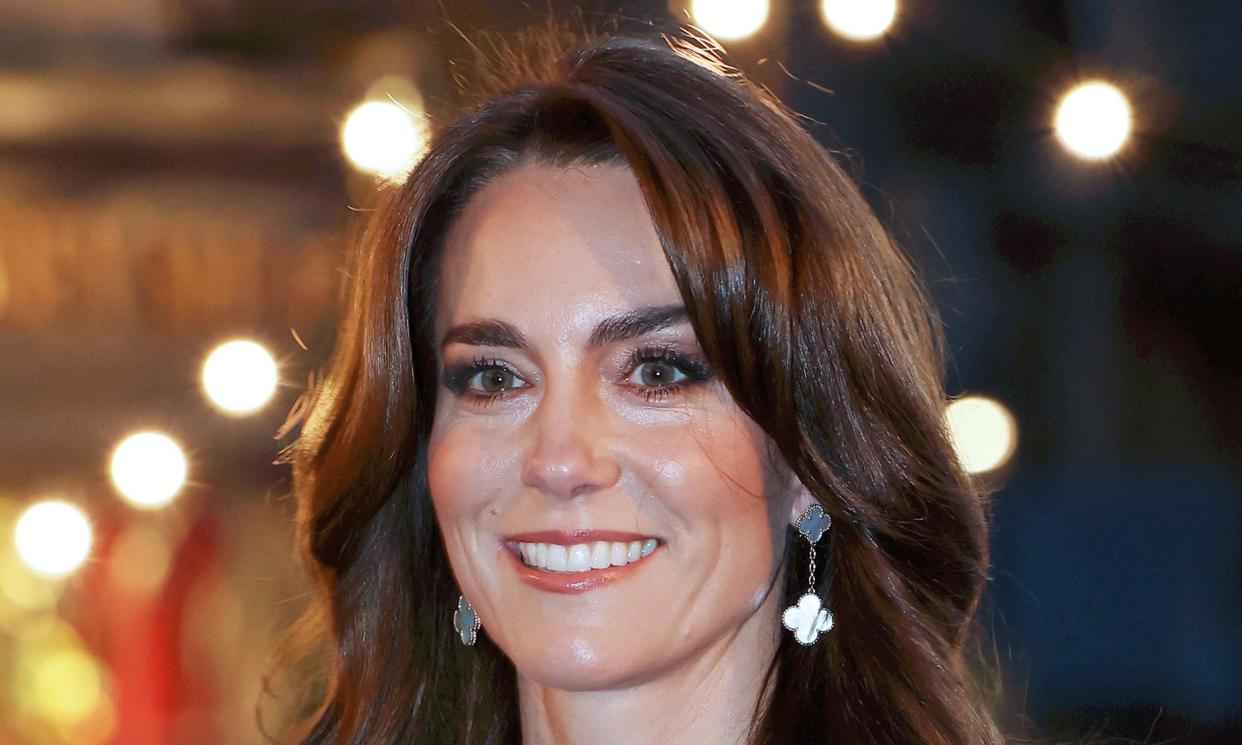‘Where is #katemiddleton?’: theories on Kate’s whereabouts go global

When the Sun published images of the Prince and Princess of Wales shopping at a farm shop at the weekend, it said it was doing so “in a bid to end weeks of online speculation which has seen wild conspiracy theories about Kate spread unchecked”.
If that was the aim, it certainly has not worked. “Do you believe this is Kate Middleton?” is the caption of one TikTok video that has been viewed 3.5m times. “Not Kate. Nooo,” reads one of the almost 2,000 comments. “I’m not even big on the royals and I knew it wasn’t her,” says someone else. Another video, titled: “Where is #katemiddleton? Cause that’s not here! [sic]”, has 1.1m views.
Ten days after Kensington Palace released a photograph of Catherine with her children – which it later was forced to admit had been altered – the enormous scale of the conspiracies it has fed and generated is becoming apparent.
The princess’s whereabouts, and the more outlandish theories attached to that question, have been the subject of frenzied online speculation, as illustrated by data seen by the Guardian. According to BrandMentions, a company that monitors the spread of hashtags and keywords online, over the past seven days the hashtags #whereiskate #katebodydouble and #katemiddleton have been used on social media accounts and webpages with a total reach of 400 million people, as measured by factors such as account followers.
The hashtags were mentioned 5,400 times, with Instagram accounting for more than eight out of 10 mentions, followed by TikTok, which accounted for 5% of mentions. Posts with those hashtags have been shared 2.3m times and liked 2.2m times.
The speculation has been truly global, with the biggest reach for the three hashtags on Facebook coming from the India Today news magazine page, while one of the biggest reaches on Instagram is from the account of Diario Libre, a newspaper in the Dominican Republic, which has 1.8 million followers.
One example of how fake news starts and spreads is the supposed revelation of an imminent royal announcement earlier this week. After rumours of a death or divorce in the royal family began to spread on social media, the hashtag #royalannouncement began to trend on X early on Monday morning.
Those rumours appear to have originated with the TikTok and Instagram site Popapologists, run by a duo who describe themselves as podcasting sisters Lauren and Chan, who are apparently from the US. On 11 March the pair posted the first in what is now a 32-part series entitled “Where TF is Kate Middleton?!?!?!”, which has now been viewed 6.1m times. The series has attracted total views of more than 20m on TikTok alone.
Related: Kate: watchdog investigating if hospital delayed data breach report
In one video posted on 16 March, the pair said they had received “insider information” that BBC Events had “reportedly been notified to be ready for an extremely important royal announcement at any moment”. “Do you know what BBC Events is responsible for covering? Weddings, coronations and funerals. Is there any world where Kate is no longer with us?” The claims spread widely, with the factchecking site Snopes identifying Popapologists as a key source.
Those reports were picked up by the News International, an English-language Pakistani newspaper that writes extensively on the royal family. Its bylined writer Wells Oster does not have any profile on LinkedIn, Facebook or other social networks, but has written more than 50 articles on the royal family this week.
On 16 March Oster published a news article headlined “Royal family cues British media for major announcement ‘at any moment’”, citing Popapologists. Screenshots of that article then began to pop up on X, where several accounts cited the report alongside reports that Charles or another member of the royal family may have died.
One blue-tick verified account @UKR_Report, that has 22,600 followers, wrote: “It is estimated that Princess Kate of Wales, a member of the United Kingdom royal family, has died.” Like the report the same day of the death of King Charles, which was picked up and amplified by major news outlets in Russia, the report was entirely fake.
Daniel Jolley, assistant professor in social psychology at Nottingham University, says that while we often talk about conspiracy theories in terms of the psychological needs they meet in those who hold them, the Princess of Wales rumours are particularly potent “because they are also entertaining”.
He added: “It feels like you’re in a movie, with you as the investigator. That sleuthing element – ooh could they or couldn’t they? That’s kind of exciting … And in the context of economic inequality, which can breed anomie, the idea of societies crumbling – it all feels that this is possible.”
Stephan Lewandowsky, professor of cognitive psychology at the University of Bristol, whose research centres on the spread of myths and misinformation, says: “One of the issues is that you then get into feedback loops, where the fact that a lot of people believe it then gives other people reason to believe things. And then all of a sudden, just because everybody else is believing it, people will say, there has to be some truth to that because my neighbour believes it. It feeds on itself.”
Much of the current frenzy will subside when Catherine resumes royal duties, “so in a sense, who cares, right?” says Lewandowsky. “The world isn’t going to be altered by whatever this person does. But the real problem is, of course, that it contributes to this blizzard of disinformation, misinformation, misleading information on social media – and it makes it increasingly difficult to differentiate between truth and falsehood. That is, in the long run, very concerning.”


